“The party is the “church”, and the leader is the earthly deity”: the theory of political religions of the historian Emilio Gentile
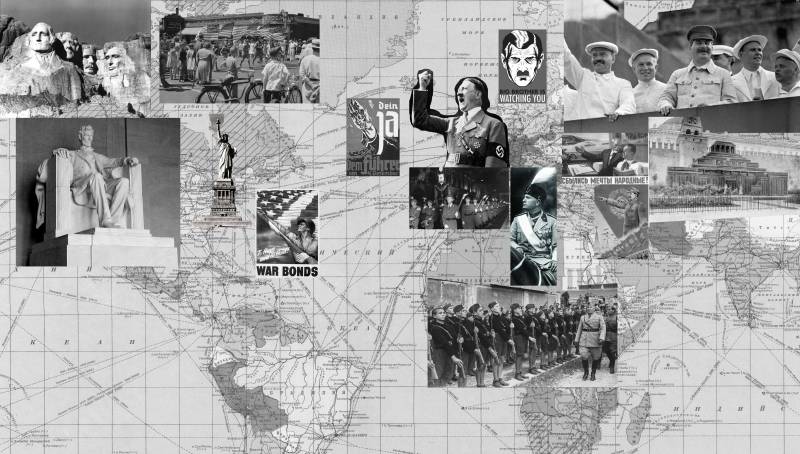
- wrote at one time the French sociologist Gustave Lebon. It was he who first considered in sufficient detail the issue of the sacralization of politics and spoke about the existence of such a phenomenon as political religion.
wrote the French thinker in The Psychology of Socialism.
Political religions belong to the more general phenomenon of secular religion (or secular religion). This term defines a more or less developed system of beliefs, myths, rituals and symbols, which gives a sacred character to some essence of this world, making it an object of worship, worship and pious devotion [1]. Of course, in the eyes of a Christian, secular religions are considered religions only in the sense of a surrogate or caricature of religion.
The most detailed theory of political and civil religions was created by the Italian historian, professor at the University of Rome La Sapienza Emilio Gentile. His book Political Religions. Between Democracy and Totalitarianism”, published in 2001, was published in Russian in 2019 by the Vladimir Dal publishing house. The essence of Gentile's theory lies in the consideration of political phenomena as expressions of the so-called "worldly religiosity”, occupying the place of traditional religions in the modern era.
As the historian of philosophy Dmitry Moiseev notes, the primary merit of Emilio Gentile is that he collected in one work all the experience of understanding the phenomenon of religions in the political sphere, focusing not only on the totalitarian regimes of the XNUMXth century, but also on the so-called civil cults, ascending to the Age of Enlightenment and found a new life in the post-war period. Gentile's theories of political religions will be considered in this material.
Totalitarianism and political religions
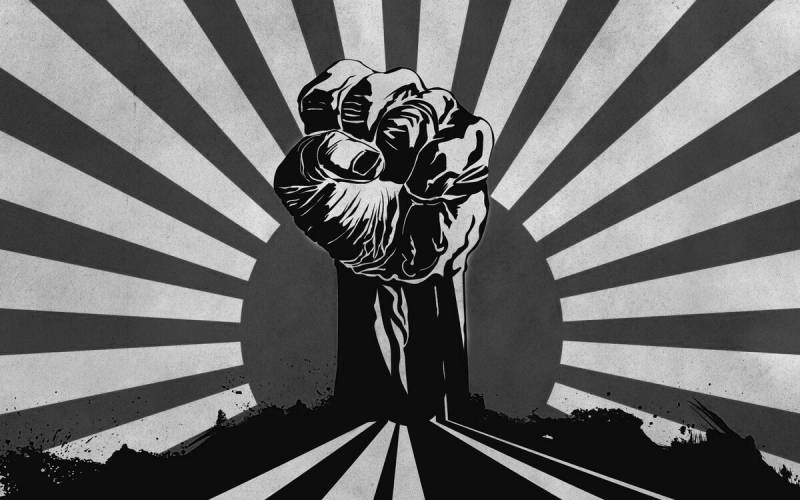
In the interwar years, a whole group of authors, to whom Emilio Gentile refers in his work, considered totalitarian political systems as political religions. The term "civil religion" goes back to the French Enlightenment and Jean-Jacques Rousseau. In particular, the French sociologist Raymond Aron (1905–1983) argued that
According to Emilio Gentile, in the conditions of modern society in special historical Under the circumstances, various forms of political religions appeared, which the historian divides into two main categories - civil religions and political religions, depending on their position and mode of action in relation to traditional religions and how they solve the issue of the relationship between the individual and the state.
Gentile defines political religion as follows:
In turn, the civil religions considered by Gentile are a manifestation of the veneration of the collective whole (as a rule, it is a secular liberal-democratic state), common to all its representatives, in the form of a certain secular set of moral, ethical and civil norms - for example, "civil pride”, “respect for the Constitution and the law”, “patriotism”, “reverence for the heroes who fell for the Motherland”, and the like.
If civil religions are not formally obligatory and leave a space of personal freedom for a person, without obliging him to a party, religious and civic position expressed in a certain way, then political religions are truly totalitarian. They seek to control not only the political behavior of citizens, but also the way they think, not allowing the expression of any position other than the “only true one” [1].
According to Gentile, the sacralization of politics reached its peak in the period between the two world wars in connection with the emergence of new totalitarian regimes. It was with the advent of totalitarianism that all aspects of political religions - both ideological and institutional - received their greatest development, which likened totalitarian regimes to new churches devoting themselves to propagating faith in the absolute and undeniable truth of their ideology, persecuting infidels and cult of people with a sacred halo. And it was with the advent of totalitarianism that the phenomenon of political religion began to be perceived as a real threat to traditional religions [1].
At the same time, the definition of totalitarianism is the subject of controversy. For example, the founder of the theory of totalitarianism, Hannah Arendt, calls only two regimes totalitarian - Hitler's and Stalin's, and does not consider Mussolini's regime as such. And this despite the fact that the term "totalitarianism" was introduced into intellectual use by the theorist of Italian fascism, the philosopher Giovanni Gentile, who endowed it with a positive meaning, noting that it denotes the organic unity of all processes occurring in the state - economic, political, cultural, social [ 3].
Emilio Gentile himself defines totalitarianism as follows:
Following Gentile, National Socialism, Fascism and Communism were totalitarian regimes that were characterized by the sacralization of politics. Thus they are, according to the historian, political religions.
"The New People of God": American Democracy as a Political Religion

However, not only totalitarian regimes have features of a secular religion. As Emilio Gentile points out, the American civil religion is the first historical example of a religion in the political realm in the modern era.
The American civil religion began to take shape during the Revolutionary War and continued to develop in the 1th century, primarily after the Civil War, coexisting with traditional religious denominations. In its values and principles, it basically identified itself with the Christian tradition [XNUMX].
The first to recognize the fundamental role of religion in American democracy was the French conservative thinker Alexis de Tocqueville. In his book Democracy in America, he noted that the United States managed to combine two principles that have often been rivals in history - adherence to religion and the spirit of freedom.
The consequence of this combination was the corresponding position of religion in the United States, which was in a special connection with the political sphere. In Tocqueville's opinion, religion, which in the United States never directly interferes in the government of society, should be considered the first political institution of this country. A. de Tocqueville did not exaggerate: the founders of the United States considered religion as an important pillar of the republican form of government, requiring high morality from citizens, the ability to sacrifice personal interests in the name of a common cause [4].
As Emilio Gentile notes, brought up in the religious and civil tradition of Puritanism, as well as in the spirit of the philosophy of the Enlightenment, the creators of the American Revolution experienced the events of the Revolutionary War in a religious key, interpreting them with the help of the eschatological myths of Protestant millenarianism. The Revolutionary War and the founding of the United States were likened to a new exodus, the attainment of the promised land, and the founding of a new Jerusalem, a "city on a hill" designed to be a beacon for all mankind. The founding fathers after their death were glorified as earthly deities and placed in the national Pantheon. Monuments and temples were dedicated to them. Washington was exalted as the new Moses, who freed the new Israel from slavery, bringing it to the promised land of freedom and independence. His birthday (February 19) became a federal holiday [1].
Americans considered the birth of the United States "an event equal in meaning to the birth of Christ”, the beginning of a new historical era in which the American people were entrusted with“the mission of the revival of mankind».
In the 1th century the civil religion developed in the direction of extolling the mission of the American people, chosen by God to bring good to all mankind. Belief in the mission entrusted to the United States by God is affirmed and spread in presidential speeches, in sermons, in historical narrative, in literature, in school education, becoming a fundamental and permanent myth of the American civil religion [XNUMX].
With the rise of industrialization and the growth of world rivalry, faith in democracy is increasingly identified with faith in the "obvious destiny" of the American nation, now interpreted as a duty to the expansion of the Anglo-Saxon race [1].
As the American novelist Herman Melville (1819–1891) wrote:
The American civil religion has its own "holy scriptures" - the Declaration of Independence and the Constitution, kept and revered like the tablets of the covenant; she has her own prophets, in particular the Pilgrim Fathers; it honors its holy heroes, like George Washington, the "American Moses" who freed the "New Nation of Israel" from English slavery, that is, the Americans living in the colonies, and led them to the promised land of freedom, independence and democracy. She honors her martyrs like Abraham Lincoln, the sacred victim killed on Good Friday, 1865, when the American nation was exposed to the resurgent fires of a brutal civil war, to atone for its guilt and re-sanctify its unity and mission. The figure of Lincoln was then joined in the civil religion martyrology by John F. Kennedy and Martin Luther King [1].
Although the civil religion of the United States was borrowed from Protestantism, bearing its distinct imprint and references to Puritanism and the biblical tradition for more than a century, over time it moved away from it as a direct and unambiguous model, becoming a purely civil creed, coexisting with both Christian and Biblical traditions. and with non-Christian denominations [1].
"Ein Reich, ein Volk, ein Führer": National Socialism as a Political Religion
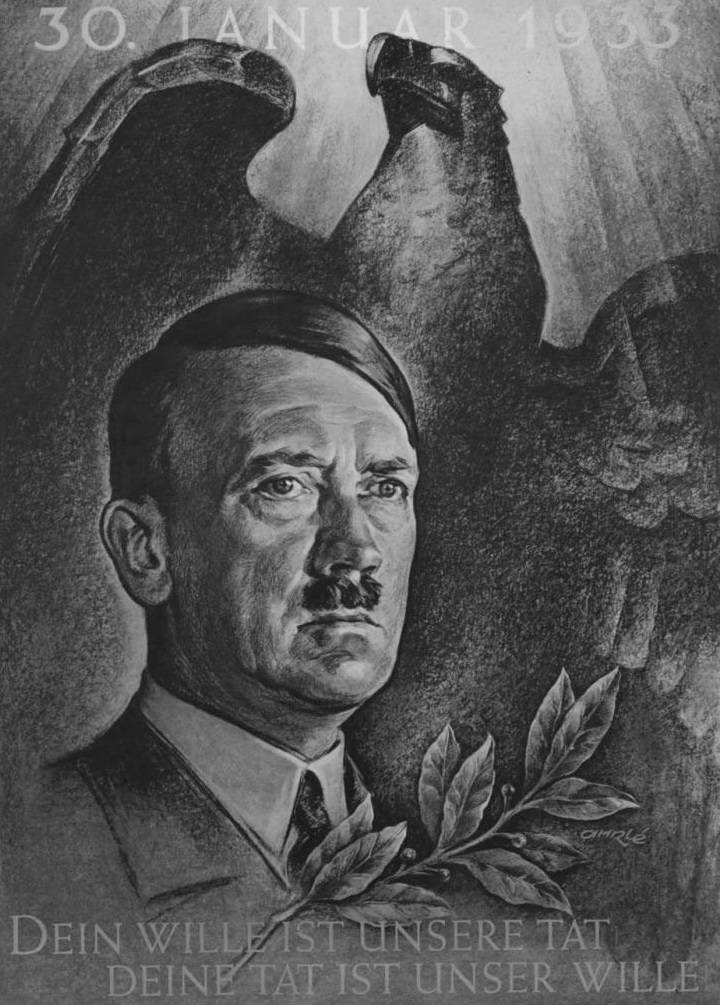
As Gentile notes, the 1th century was the most fruitful era for the sacralization of politics. The wars and political revolutions that created the world in which we live, with the emergence of new nations and states, took place everywhere in the name of collective beliefs and myths that consecrated political entities [XNUMX].
During this period, the state, race and class became the object of sacralization and acquired features that were previously characteristic of traditional religions - their dogmas, their "church", their rites, their "inquisition" and their "heretics".
National Socialism made its special contribution to the sacralization of politics through beliefs, rituals and symbols of blood and race, which soon became one of the main and most visible aspects of the new German regime. The political religion of National Socialism brought to the altar the Aryan race, the cult of blood and the personality of the Fuhrer, the savior of Germany and the messiah of the Third Reich, entangling all public life with a dense network of rituals and symbols that evoke the archaic myths of the German religion, mixing them with the myths of modern paganism as opposed to Christian denominations [1].
The sacralization of politics in National Socialism acquired a dominant and all-encompassing role, affecting all aspects of German life in its dogmas, myths, rituals and symbols. In the political religion of National Socialism, thanks to skillful propagandistic direction, mass liturgical representation found its clearest expression, culminating in the worship of the Fuhrer [1].
In 1941, Raymond Aron, who lived in Germany at the end of the Weimar period, recalled the mesmerizing effect of Nazi ceremonies and rituals performed by Hitler with the participation of huge crowds of people [1]. The Swiss psychiatrist Carl Gustav Jung believed that "of the two types of dictators - leaders and shamans - Hitler belonged to the latter". According to Jung, he was able to "hear the voice" which "represents the collective unconscious of his race" [five].
One can be skeptical of Jung's theories, but Hitler's almost magical effect on German audiences is well documented. Foreign observers, including those hostile to Nazism, could witness the experience of the sacred, as the French ambassador to Berlin André François Poncet reports, describing the May Day ceremony.
National Socialism, like Fascism, did not openly declare war on the Christian churches; moreover, in his program he asserted freedom of religion for all religious denominations. Although Hitler deeply despised Christianity, he did not encourage those currents within his party that sought to open religious war against Christianity and Catholicism in the name of a purely Aryan and Germanic national religion [1].
Even the main slogan of the Nazi state - Ein Volk, ein Reich, ein Führer (one people, one Reich, one leader), as noted by some researchers, has theological roots, for a similar saying is in the book of the New Testament Epistle to the Ephesians - one Lord, one faith, one baptism. And some German Christians proclaimed Adolf Hitler "God-sent ruler who fights for the soul of the German people [9]».
And yet, as Gentile notes, in its very political conception and practice, National Socialism extolled its own new religion, combining in it its political ideology with the beliefs, symbols, myths and rites of the ancient Germanic religion. Despite the fact that the Nazi government did not openly support the supporters of neo-paganism, its essential consonance with Nazi ideology was obvious to everyone.
“Whoever is not with us is our enemy”: communism as a political religion
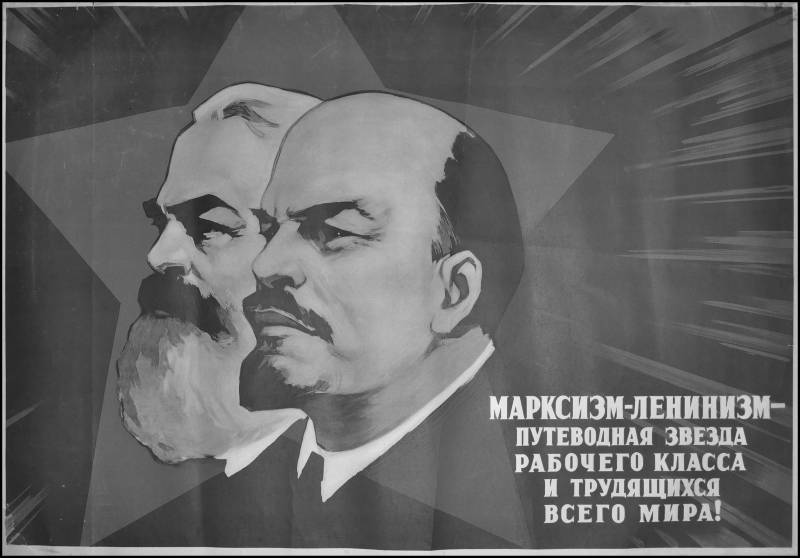
The Bolshevik Revolution, according to Gentile, also took place in the context of the sacralization of politics, which was promoted by the Great War. Despite the fact that communism declared atheism, materialism and theomachism, this did not prevent the communists from adopting the technological elements of their own cult from traditional religions, primarily from Christianity.
As many researchers note, Marxism has many features that make it related to religion. The fact is that Marxism actually reproduces the Christian logic of the Apocalypse, with the only difference that the place of God is occupied by people and history – just as the second coming of Christ is the end of history, so communist society is the final, “highest” stage of historical development.
Bolshevism did not define itself as a religion, although some prominent Bolsheviks, such as Lunacharsky, were long-term adherents of the “god-builders” movement, which interpreted Marxism as a new religion, but in Bolshevik Russia, after the revolution, the process of sacralization of politics began. Subsequently, it was further developed in the form of establishing a system of beliefs, rituals, symbols and ceremonies that gave a sacred character to the events and protagonists of the Bolshevik revolution [1].
A new calendar, new national holidays, new rites and new symbols were established to combat the rites of the Orthodox Church and eradicate the religious beliefs of the past, replacing them with a new atheistic faith in the socialist homeland, an outpost of the triumph of reason, progress and the liberation of mankind. But, as happens with all political religions, the influence of religious tradition made itself felt in the mass politics of Bolshevism [1].
Despite the fact that the Communist Party professed an atheistic and materialistic ideology and fought against any religion as "opium for the people", Bolshevism transformed the ideology into a dogmatic dogma, the party into a church, and its head into an earthly deity [1].
Lenin, shortly after his death in 1924, was declared eternally alive due to the immortality of his thought, and his embalmed body became the subject of a cult like the saints of the Orthodox Church [1]. The mythological and symbolic iconography of Soviet propaganda copied the canons of the iconographic tradition of Orthodoxy, and the new eschatological mythology of world communism also absorbed elements of the traditional trends of millenarianism. As E. Gentile notes, Marxist atheism has become a new religion of Russian Bolshevism.
From the point of view of the Austrian writer René Fülöp-Miller, Russian Bolshevism was the result of the resurrection of Russian ideas of chiliasm and millenarianism, combined with the revolutionary messianism of Marxism. Although he claimed to be scientific, according to Fülöp-Miller,
Some contemporaries, who saw the construction of the Soviet state live, even likened communism to Islam. For example, the philosopher Bertrand Russell, who in 1920, after a trip to Russia, wrote that Bolshevism is not only a political doctrine, but also a religion with its own dogmas and sacred texts.
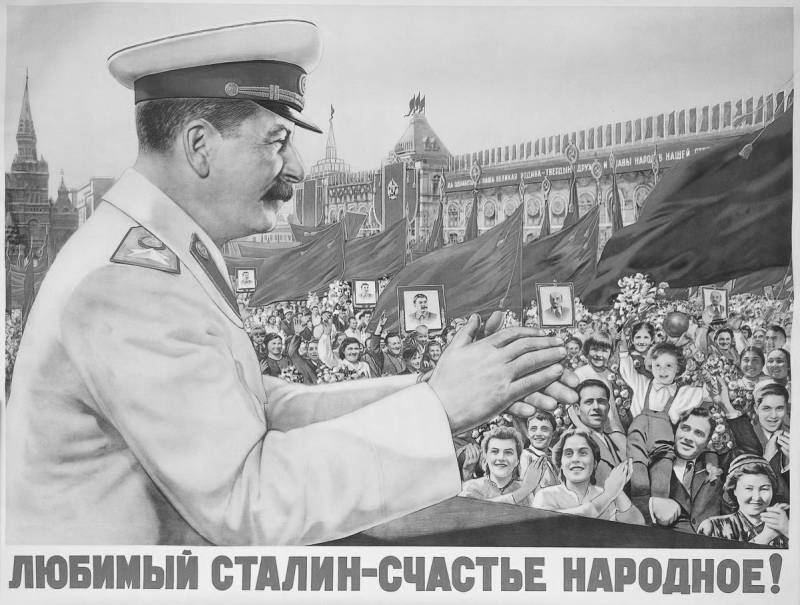
As Gentile notes, the sacralization of the party paved the way for the sacralization of Stalin, who became its undisputed leader. After 1929, political religion in Russia focused mainly on the deification of Stalin, who until his death in 1953 played a dominant role in the party and throughout the Soviet system, “like a ruthless god».
The Bolsheviks were convinced of their truth and their inevitable triumph, and all who resisted their truth were considered agents of evil who must be destroyed. And therefore, they acted according to the principle voiced by the poet Nikolai Minsky in the “Hymn of the Workers”:
Italian fascism as a political religion
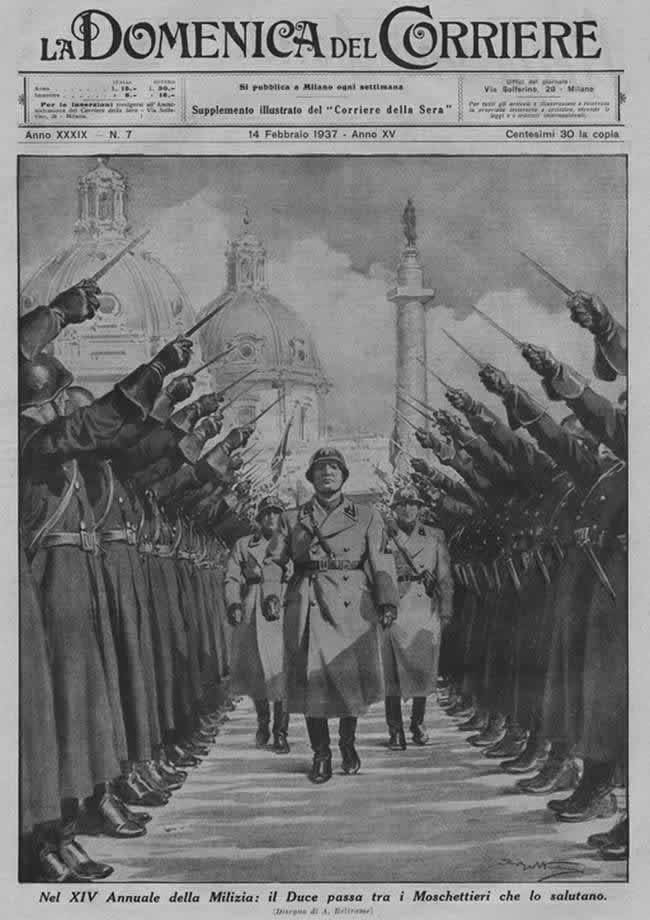
According to E. Gentile, the key to explaining the phenomenon of fascism is the concept of political religion, that is, a type of religion that translates an ideology, movement or political regime into the sacred sphere by deifying the secular essence, transformed into a myth [3]. In his opinion, fascism was, in fact, the first political religion of the twentieth century, with all the attributes of an institutionalized cult.
However, it should be noted that Italian fascism did not fight traditional religion, since the policy of the concordat included Christianity in the tradition of a confessional authoritarian state. In its attitude towards the Church, fascism was guided not by ideological fanaticism, but by political realism, practicing what could be called a strategy of syncretic coexistence, that is, striving to include the Catholic Church in its totalitarian project. Mussolini, according to the just remark of Armando Carlini, saw in the Church "only its human and historical sidebecause he himself wassecular person, completely worldly' and besides, he always remained 'follower of Nietzsche [8]».
Mussolini was well aware (and this understanding was probably strengthened by reading the works of Le Bon and Pareto) what value and power religion has in collective life and how strong faith and mythological-symbolic tradition are deeply rooted in the minds of the masses. Therefore, he was convinced that fascism, insisting on the primacy of politics and state fascist ethics, nevertheless, should not be at war with religion [8].
Nevertheless, Gentile points out that fascism was like a secular religion from the beginning, in that it experienced political reality through myths, rituals, and symbols. Once in power, it institutionalized as a political religion, competing with the Catholic Church in the struggle for spiritual control over society and the corresponding formation of consciousness and conscience.
If for Nazism and Communism the state was not a goal, but a means of achieving a higher goal (in one case, the domination of a race and a nation, in the second, the creation of a classless society), then the fascists, on the contrary, quite consciously affirmed the priority of the state as the highest and optimal goal in themselves. , and not as a means in the revolutionary struggle [8]. The fascist state assumed an instructive, educational, apostolic and charitable mission [1].
According to Gentile, fascism was the first totalitarian movement of the 1th century that openly proclaimed itself a political religion, affirming the primacy of faith in individual and mass activism, unequivocally appealing to the irrational as the energy of political mobilization, and elevated mythological thinking to the pinnacle of power. Fascism argued that such thinking is the only type of collective political culture adequate to the masses, who by their nature are incapable of self-government [XNUMX].
Fascism gave a sacred character to the figure of the charismatic leader as the interpreter of the national consciousness and the main bond of the totalitarian state and prescribed a code of ethical precepts, mandatory for the citizen, established a collective political liturgy to glorify the deified state [1]. It was the state that became the main subject of the cult of fascism. According to the Nazis, there is no individual outside the state, nothing human or spiritual exists and has no value outside the state.
Those who were not guided by the myths and rituals of the fascist religion and did not obey its commandments were banned in the national community [1].
"Disenchanted" modernity (as a conclusion)
The First World War contributed both to the politicization of historical religions, which rose to the service of the nation in almost all countries, and to the sacralization of the homeland. Fascism, Nazism and Bolshevism (the success of which was made possible precisely thanks to the war) became the product of this very war, borrowing from it the religious component of their policy. It was the First World War that produced new material for the creation of political religions, which was widely used by totalitarian movements [1].
The XNUMXth century was not only a century of bloody world wars, but also a century of ideologies that actively used political myths and elements of secular religion, a century of great leaders of the leader type. After the collapse of all ideologies and the triumph of liberal democracy, political religions seem to have disappeared from the historical stage. The modern "disenchanted" world, it seems, is generally devoid of a pronounced spiritual content.
However, as E. Gentile notes,
It should be recognized that for the most part modern political religions have turned into simulacra, which are used to sacralize or desacralize political leaders, manipulate ratings and other forms of imitation of social mobilization. However, any political power, including democracy, needs political mythology and produces it, because any form of political government operates in the context of a symbolic series that legitimizes it.
As the historian D. Moiseev notes, in our time, the discourse of the so-called social justice warriors has been actively developed, aggressively imposing their dogma, which is extremely close to the definition of a civil religion. The “collective whole” of SJW is not the state or the party, but a certain impersonal mass of the “oppressed”, which includes various groups of various minorities. "oppressed" XXI century. turns out to be a collective construct, close in its symbolic meaning to the “nation” of the 1th century. and the "class" of the twentieth century. He becomes a model of reverence and is proclaimed the goal of a socially responsible state policy. Already today we see how in Western societies people who do not follow this discourse or ignore it are subjected to all sorts of harassment and persecution by the “progressive public” [XNUMX].
Thus, the study of Emilio Gentile, despite the controversy of some of his theses, is of interest today.
Использованная литература:
[1]. Emilio Gentile Political Religions. Between democracy and totalitarianism, St. Petersburg, Vladimir Dal, 2019.
[2]. Gustave Lebon. Psychology of socialism / G. Lebon per. from fr. – 3rd edition – M.: Sotsium, 2020.
[3]. Moiseev D.S. Political philosophy of Italian fascism. Formation and development of the doctrine. – M.; Yekaterinburg: Armchair scientist, 2019.
[4]. Kosmach, P.G. French thinker A. de Tocqueville on the role of religion in the socio-political life of the USA / P.G. Kosmach // Scientific works of the Republican Institute of Higher Education. Historical and psychological and pedagogical sciences: Sat. scientific articles. - 2018. - Issue 18. - Part 1. - P. 224 - 229.
[5]. The Psychology of Dictatorship by Dr. C. G. Jung The Living Age, December 1, 1936.
[6]. R. Fiilop-Miller, Il volto del bolscevismo (1926), Milano, 1930, p. 47
[7]. Cit. in: R. A. Medvedev, Lo stalinisto (1971), Milano, 1982, p. 442.
[8]. Emilio Gentile. Fascism: history and interpretation. - St. Petersburg: Vladimir Dal, 2022.
[9]. Yazovskaya, O. V. Ideological concepts of the national essence of Japan and Germany in the 30s. XX century: similarities and differences // Bulletin of the Chelyabinsk State University. Series. Philosophy. Sociology. Culturology. 2014. No. 17 (346). Issue. 33. P. 40-43.
Information